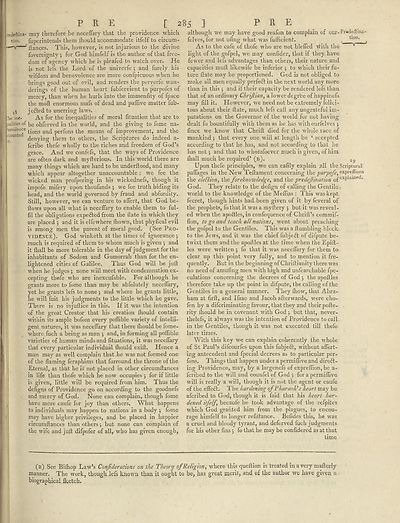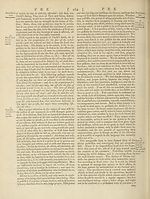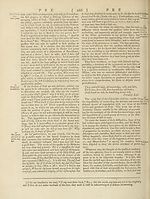Encyclopaedia Britannica, or, a Dictionary of arts, sciences, and miscellaneous literature : enlarged and improved. Illustrated with nearly six hundred engravings > Volume 17, Poetry-RHI
(303) Page 285
Download files
Complete book:
Individual page:
Thumbnail gallery: Grid view | List view

i8
he ine-
jualities of
rovidence
ccounted
P R E [ 2
may therefore be neceflary that the providence which
fuperintends them thould accommodate itfelf to circum-
ftances. This, however, is not injurious to the divine
fovereignty; for God himfelf is the author of that free¬
dom of agency which he is pleafed to watch over. He
is not lefs the Lord of the univerfe •, and furely his
wifdom and benevolence are more conlpicuous when he
brings good out of evil, and renders the perverfe wan¬
derings of the human heart fubfervient to purpofes of
mercy, than when he hurls into the immenfity of fpace
the moll enormous mafs of dead and paffive matter fub-
jefted to unerring laws.
As for the inequalities of moral fituation that are to
be obferved in the world, and the giving to fome na¬
tions and perfons the means of improvement, and the
denying them to others, the Scriptures do indeed a-
fcribe thefe wholly to the riches and freedom of God’s
grace. And we confefs, that the ways of Providence
are often dark and myfterious. In this'world there are
many things which are hard to be underflood, and many
which appear altogether unaccountable : we fee the
wicked man profpering in his wickednefs, though it
impofe mifery upon thoufands •, we fee truth hiding its
head, and the world governed by fraud and abfurdity.
Still, however, we can venture to affert, that God be¬
llows upon all what is neceflary to enable them to ful¬
fil the obligations expefled from the (late in which they
are placed ; and it is elfewhere drown, that phyfical evil
is among men the parent of moral good. (See Pro¬
vidence). God winketh at the times of ignorance;
much is required of them to whom much is given ; and
it fliall be more tolerable in the day of judgment for the
inhabitants of Sodom and Gomorrah than for the en¬
lightened cities of Galilee. Thus God will be juft
when he judges ; none will meet with condemnation ex¬
cepting thofe who are inexcufable. For although he
grants more to fome than may be abfolutely neceflary,
yet he grants lefs to none; and where he grants little,
he will fuit his judgments to the little which he gave.
There is no injuftice in this. If it was the intention
of the great Creator that his creation fliould contain
within its ample bofom every poffible variety of intelli¬
gent natures, it was neceflary that there ftiould be fome-
where fuch a being as man ; and, in forming all poflible
varieties of human minds and fituations, it was neceflary
that every particular individual fliould exift. Hence a
man may as well complain that he was not formed one
of the flaming feraphims that furround the throne of the
Eternal, as that he is not placed in other circumfiances
in life than thofe which he now occupies ; for if little
is given, little will be required from him. Thus the
defigns of Providence go on according to the goodnefs
and mercy of God. None can complain, though fome
have more caufe for joy than others. What happens
to individuals may happen to nations in a body ; fome
may have higher privileges, and be placed in happier
circumftances than others; but none can complain of
the wife and juft difpofer of all,- who has given enough.
85 ] P R E
although we may have good reafon to complain of our-H®deflina-
felves, for not ufing what was fufficient. , tlon‘
As to the cafe of thofe who are not blefled 'ftith the
light of the gofpel, we may confider, that if they have
fewer and lefs advantages than others, their nature and
capacities muft likewife be inferior ; to which their fu¬
ture ftate may be proportioned. God is not obliged to
make all men equally perfe£l in the next world any more
than in this ; and it their capacity be rendered lefs than
that of an ordinary Chrijlian, a lower degree of happinefs
may fill it. However, we need not be extremely felici¬
tous about their rtate, much lefs call any ungrateful im¬
putations on the Governor of the world for not having-
dealt fo bountifully with them as he has with ourfelves ;
fince we know that Chrift died for the whole race of
mankind; that every one will at length be ‘ accepted
according to that he has, and not according to that he
has not; and that to whomfoever much is given, of him
flrall much be required’ (b).
Upon thefe principles, we can eafily explain r11 the Scriptural
pafifages in the New Teftament concerning the purpofe, expreffions
the e left ion, the foreknowledge, and the predef motion of ext1*a‘ne^'
God. They relate to the defign of calling the Gentile
wrorld to the knowledge of the Meflias : This was kept
fecret, though hints had been given of it by feveral of
the prophets, fo that it was a myftery ; but it was reveal¬
ed when the apoftles, in confequence of Chrift’s commif-
fion, to go and teach all nations, went about preaching
the gofpel to the Gentiles. This w'as a ftumbling-blcck.
to the Jews, and it was the chief fubjeft of difpute be¬
twixt them and the apoflles at the time when the Epift-
les were written ; fo that it was neceflary for them to
clear up this point very fully, and to mention it fre¬
quently. But in the beginning of Chriftianity there was
no need of amufing men with high and unfearchable fpe-
culations concerning the decrees of God ; the apoftles
therefore take up the point in difpute, the calling of the
Gentiles in a general manner. They flrow, that Abra¬
ham at firft, and Ifaac and Jacob afterwards, were cho-
fen by a diferiminatingfavour, that they and their pofte-
rity ftiould be in covenant with God ; but that, never-
thelefs, it always was the intention of Providence to call
in the Gentiles, though it was not executed till thefe
later times.
With this key we can explain coherently the whole
of St Paul’s difeourfes upon this fubjedl, without aflert-
ing antecedent and fpecial decrees as to particular per¬
fons. Things that happen under a permiflive and direfl¬
ing Providence, may, by a largenefs of expreflion, be a-
feribed to the will and counfel of God ; for a permiflive
will is really a will, though it is not the agent or caufe
of the effect. The hardening of Pharaoh''s heart may be
aferibed to God, though it is faid that his heart har¬
dened itfelf, becaufe he took advantage of the refpites
which God granted him from the plagues, to encou¬
rage himfelf to longer refiftance. Belides this, he was
a cruel and bloody tyrant, and deferved fuch judgments
for his other fins; fo that he may be confidered as at that
time
(b) See Bifliop Law’s Confderations on the Theory of Religion, where this queftion is treated in a very mafterly
manner. The work, though .lefs known than it ought to be, has great merit, and of the author we have given a
biographical Iketch.
he ine-
jualities of
rovidence
ccounted
P R E [ 2
may therefore be neceflary that the providence which
fuperintends them thould accommodate itfelf to circum-
ftances. This, however, is not injurious to the divine
fovereignty; for God himfelf is the author of that free¬
dom of agency which he is pleafed to watch over. He
is not lefs the Lord of the univerfe •, and furely his
wifdom and benevolence are more conlpicuous when he
brings good out of evil, and renders the perverfe wan¬
derings of the human heart fubfervient to purpofes of
mercy, than when he hurls into the immenfity of fpace
the moll enormous mafs of dead and paffive matter fub-
jefted to unerring laws.
As for the inequalities of moral fituation that are to
be obferved in the world, and the giving to fome na¬
tions and perfons the means of improvement, and the
denying them to others, the Scriptures do indeed a-
fcribe thefe wholly to the riches and freedom of God’s
grace. And we confefs, that the ways of Providence
are often dark and myfterious. In this'world there are
many things which are hard to be underflood, and many
which appear altogether unaccountable : we fee the
wicked man profpering in his wickednefs, though it
impofe mifery upon thoufands •, we fee truth hiding its
head, and the world governed by fraud and abfurdity.
Still, however, we can venture to affert, that God be¬
llows upon all what is neceflary to enable them to ful¬
fil the obligations expefled from the (late in which they
are placed ; and it is elfewhere drown, that phyfical evil
is among men the parent of moral good. (See Pro¬
vidence). God winketh at the times of ignorance;
much is required of them to whom much is given ; and
it fliall be more tolerable in the day of judgment for the
inhabitants of Sodom and Gomorrah than for the en¬
lightened cities of Galilee. Thus God will be juft
when he judges ; none will meet with condemnation ex¬
cepting thofe who are inexcufable. For although he
grants more to fome than may be abfolutely neceflary,
yet he grants lefs to none; and where he grants little,
he will fuit his judgments to the little which he gave.
There is no injuftice in this. If it was the intention
of the great Creator that his creation fliould contain
within its ample bofom every poffible variety of intelli¬
gent natures, it was neceflary that there ftiould be fome-
where fuch a being as man ; and, in forming all poflible
varieties of human minds and fituations, it was neceflary
that every particular individual fliould exift. Hence a
man may as well complain that he was not formed one
of the flaming feraphims that furround the throne of the
Eternal, as that he is not placed in other circumfiances
in life than thofe which he now occupies ; for if little
is given, little will be required from him. Thus the
defigns of Providence go on according to the goodnefs
and mercy of God. None can complain, though fome
have more caufe for joy than others. What happens
to individuals may happen to nations in a body ; fome
may have higher privileges, and be placed in happier
circumftances than others; but none can complain of
the wife and juft difpofer of all,- who has given enough.
85 ] P R E
although we may have good reafon to complain of our-H®deflina-
felves, for not ufing what was fufficient. , tlon‘
As to the cafe of thofe who are not blefled 'ftith the
light of the gofpel, we may confider, that if they have
fewer and lefs advantages than others, their nature and
capacities muft likewife be inferior ; to which their fu¬
ture ftate may be proportioned. God is not obliged to
make all men equally perfe£l in the next world any more
than in this ; and it their capacity be rendered lefs than
that of an ordinary Chrijlian, a lower degree of happinefs
may fill it. However, we need not be extremely felici¬
tous about their rtate, much lefs call any ungrateful im¬
putations on the Governor of the world for not having-
dealt fo bountifully with them as he has with ourfelves ;
fince we know that Chrift died for the whole race of
mankind; that every one will at length be ‘ accepted
according to that he has, and not according to that he
has not; and that to whomfoever much is given, of him
flrall much be required’ (b).
Upon thefe principles, we can eafily explain r11 the Scriptural
pafifages in the New Teftament concerning the purpofe, expreffions
the e left ion, the foreknowledge, and the predef motion of ext1*a‘ne^'
God. They relate to the defign of calling the Gentile
wrorld to the knowledge of the Meflias : This was kept
fecret, though hints had been given of it by feveral of
the prophets, fo that it was a myftery ; but it was reveal¬
ed when the apoftles, in confequence of Chrift’s commif-
fion, to go and teach all nations, went about preaching
the gofpel to the Gentiles. This w'as a ftumbling-blcck.
to the Jews, and it was the chief fubjeft of difpute be¬
twixt them and the apoflles at the time when the Epift-
les were written ; fo that it was neceflary for them to
clear up this point very fully, and to mention it fre¬
quently. But in the beginning of Chriftianity there was
no need of amufing men with high and unfearchable fpe-
culations concerning the decrees of God ; the apoftles
therefore take up the point in difpute, the calling of the
Gentiles in a general manner. They flrow, that Abra¬
ham at firft, and Ifaac and Jacob afterwards, were cho-
fen by a diferiminatingfavour, that they and their pofte-
rity ftiould be in covenant with God ; but that, never-
thelefs, it always was the intention of Providence to call
in the Gentiles, though it was not executed till thefe
later times.
With this key we can explain coherently the whole
of St Paul’s difeourfes upon this fubjedl, without aflert-
ing antecedent and fpecial decrees as to particular per¬
fons. Things that happen under a permiflive and direfl¬
ing Providence, may, by a largenefs of expreflion, be a-
feribed to the will and counfel of God ; for a permiflive
will is really a will, though it is not the agent or caufe
of the effect. The hardening of Pharaoh''s heart may be
aferibed to God, though it is faid that his heart har¬
dened itfelf, becaufe he took advantage of the refpites
which God granted him from the plagues, to encou¬
rage himfelf to longer refiftance. Belides this, he was
a cruel and bloody tyrant, and deferved fuch judgments
for his other fins; fo that he may be confidered as at that
time
(b) See Bifliop Law’s Confderations on the Theory of Religion, where this queftion is treated in a very mafterly
manner. The work, though .lefs known than it ought to be, has great merit, and of the author we have given a
biographical Iketch.
Set display mode to:
![]() Universal Viewer |
Universal Viewer | ![]() Mirador |
Large image | Transcription
Mirador |
Large image | Transcription
Images and transcriptions on this page, including medium image downloads, may be used under the Creative Commons Attribution 4.0 International Licence unless otherwise stated. ![]()
| Permanent URL | https://digital.nls.uk/192352798 |
|---|
| Attribution and copyright: |
|
|---|
| Description | Ten editions of 'Encyclopaedia Britannica', issued from 1768-1903, in 231 volumes. Originally issued in 100 weekly parts (3 volumes) between 1768 and 1771 by publishers: Colin Macfarquhar and Andrew Bell (Edinburgh); editor: William Smellie: engraver: Andrew Bell. Expanded editions in the 19th century featured more volumes and contributions from leading experts in their fields. Managed and published in Edinburgh up to the 9th edition (25 volumes, from 1875-1889); the 10th edition (1902-1903) re-issued the 9th edition, with 11 supplementary volumes. |
|---|---|
| Additional NLS resources: |
|

